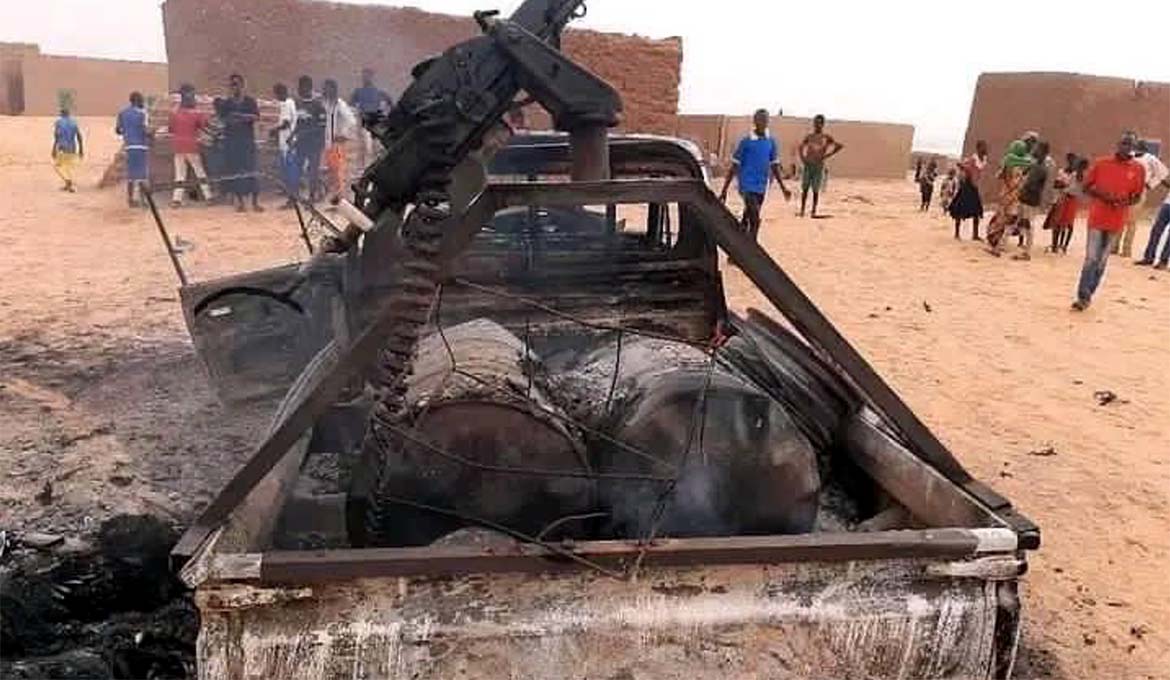On Tuesday, the northern rebels (CMA) stated they had claimed control of a military camp in Bourem, signifying a continued fallout between the army and the rebels. The clashes have intensified after the capture of the camp, which is 90 kilometres from the city of Gao, a strategic city in the country.
The CMA spokesperson, Mohamed Elmaouloud Ramadane, said they lost nine fighters and killed about 97 Mali soldiers. He insisted they had attacked four army positions in the town and made off with vehicles, weapons, and ammunition. The CMA also claimed that rebels had briefly seized control of a military camp but later retreated.
“I confirm the CMA took control of the camp around 10 a.m. after very violent fighting,” said a CMA spokesperson.
The Malian Army General Staff said ten army combatants were killed while repelling the attack in Bourem, while 46 militiamen were killed during the operation. However, he did not mention the camp or refer to the rebels (CMA) by name but said the situation around the town was under control. The surviving rebels withdrew towards the north.
The Coordination of Azawad Movements (CMA) comprises three rebel groups: the National Movement for the Liberation of Azawad, the Arab Movement of Azawad and the High Council for the Unity of Azawad. The NLMA is reportedly willing to work with France against terrorism, drug trafficking, and organised crime.
The coalition of Tuareg independence and Arab nationalist groups was formed during the Northern Mali conflict 2014. The rebels are vehemently accusing the ruling military junta of foot-dragging, and it has been planning vast operations to secure the populations of northern Mali.
The CMA has been fighting the army since August. The conflict has been unleashed in part by the departure of a United Nations peacekeeping mission. The clashes are happening in the northern parts of Mali, which the rebels seek to cut off from Mali.
“The attacks that took place took place in northern Mali, and northern Mali was where a lot of the French forces were concentrated, and the U.N. forces were also heavily concentrated in these areas,” said Dr Shaantanu Shankar.
Clashes appear to be intensifying as both sides seek to control territory in areas recently vacated by the U.N. Bourem is just 90 kilometres (55 miles) north of the strategic city of Gao.
Northern Mali is the region that was the source of the Malian crisis initially before the 2015 peace agreement. Al Qaeda and ISIS are gaining more control in areas as they take advantage of the Mali government led by Assimi Gota and rebel groups that signed the peace deal.
This conflict between the army and the rebels could worsen an Islamist insurgency in Mali.
What will be the potential impact of the intensifying clashes between the Malian Army and the Coordination of Azawad Movement rebels on the Islamist insurgency in Mali?
The clashes between the Malian Army and the Coordination of Azawad Movement rebels in Mali will absolutely have many impacts on the Islamist insurgency in the country.
The situation is diverting crucial resources and attention away from the fight against Islamist insurgents in other regions, and that will potentially allow these groups to regroup and expand at will. Furthermore, the conflict will create opportunities for shifting alliances and exploiting chaos and clashes by Islamist insurgent groups.
This will lead to a more fragmented security environment, as is currently happening with Al Qaeda and ISIS. The humanitarian crisis resulting from ongoing clashes has led to the loss of lives and displaced civilians, making them susceptible to recruitment by extremist groups and hindering political solutions.
This regional instability further complicated the enjoyment of freedom by a new government after the coup.
Amid the ongoing rebel blockade, commercial flights to Timbuktu were halted. Sky Mali, the only commercial airline flying to Timbuktu, cancelled its flights. Timbuktu has been under a month-long Islamist blockade. These events have rendered the city isolated. The residents lamented the situation:
“We heard several shell shots at Timbuktu airport. Flights are cancelled,” said residents. “Now Timbuktu is completely closed. The access roads are cut; the boats no longer come,” they lament.
Av Baya Osborn (lucrust.com) för NewsVoice. Osborn är specialiserad på internationella konflikter och säkerhetsstudier. Han är baserad i Kenya.



